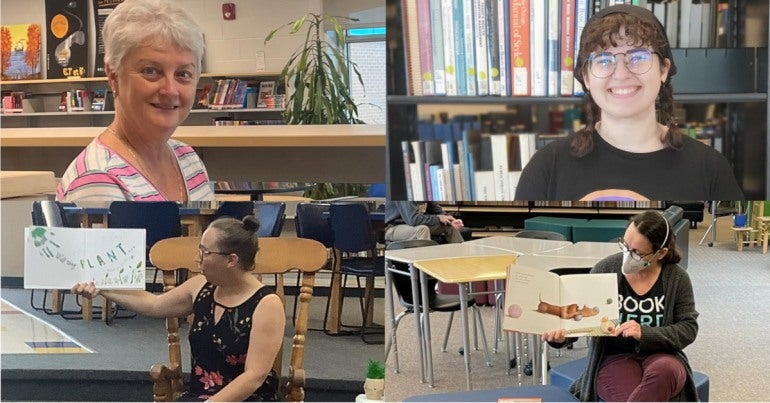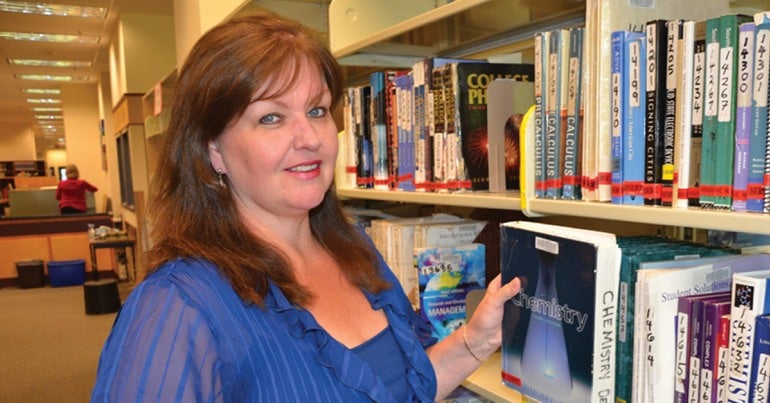 Vancouver, British Columbia
Vancouver, British Columbia
CUPE 2950
“Helping people is the most important aspect of what I do”
Since September 2022, I have been working as a library assistant at the University of British Columbia. Our library offers services and collections that specifically cater to the university’s business school.
My daily tasks include working at the circulation desk, tracking down lost books, and overseeing the faculty publications database where the business school’s publications are archived. I’m also in charge of designing clear and informative library signage to make the library more accessible. I contribute to our library’s Facebook page, and help craft events and displays on various themes, namely cultural days and other days of significance. And I answer a lot of questions, especially where to find things and how to use the printers.
One of the tasks that might surprise people is vacuuming! Vacuuming is a crucial part of maintaining the library’s collection, preventing dust and mould buildup. We vacuum the tops of books and other visibly dirty areas. Book repair was something I learned about in college, but I never imagined I would be vacuuming books. I’m now very efficient at it!
Recently, a colleague and I spent six months vacuuming every book in the stacks and all the shelves, on top of our regular tasks. It hadn’t been done for a while. We must be very careful when vacuuming to avoid damaging older, fragile books. It might sound odd, but this practice helps protect the longevity of our collection.
Our library is a hub for students to meet, relax, study, and focus. I have a Library and Information Technology diploma and a bachelor’s degree in Business Administration, so I can blend both worlds to provide tailored assistance to the business school’s academic staff and students.
In fact, each staff member brings their unique expertise and perspective to the job. It enables us to provide comprehensive support and resources to business faculty members and students that might not be available at other campus libraries. Without library workers’ guidance, students might struggle with everything – from printing to finding classrooms, doing coursework, or using software effectively – and there would be major service gaps leaving people completely lost.
Despite the rewards, challenges persist, including training, staffing, and patron expectations. I received complete training on some, but not all the tasks assigned to me. For instance, I had to find training resources on my own to learn how to manage the faculty publications database. A comprehensive manual for new staff containing updated procedures would be a game-changer, especially when taking over the tasks of a worker who is no longer around.
As for staffing, our library currently has just enough staff to run it, but no backup. If multiple people take a sick day, our opening hours may be affected. We also can’t always attend work-related or union events if someone doesn’t stay behind or if workers from other campus libraries don’t volunteer to cover for us.
Hiring is complex. We need more options for staffing to ensure full coverage for the library, but we must also provide workers with flexibility and a better work-life balance. I’m sure that having opportunities to work from home would help address some of our staffing problems.
There is also the issue of managing patron expectations. Some visitors come with unrelated, overwhelming questions and expect detailed answers. Sometimes, we can’t help them, or we redirect them elsewhere, and they get frustrated. Clear communication about our role would alleviate this frustration. If everyone had a better understanding of what they can reasonably expect from library workers, they would better know what we can do to help.
Beyond a doubt, helping people is the most important aspect of what I do. Seeing a student achieve a good grade on their paper, or receiving thanks from a faculty member for highlighting their work is incredibly rewarding. Recently, I drew attention to a professor’s work in the library after adding it to the faculty publications database, and he expressed his appreciation for the positive effects it had on promoting his work across the school. It’s these interactions that keep me going, reminding me of the positive impact I have as a library worker.



